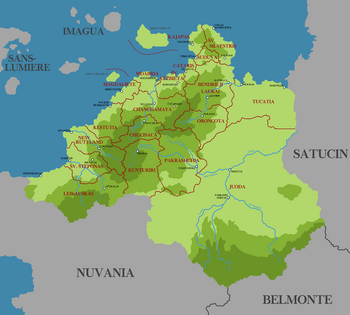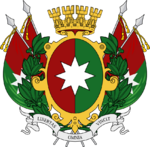Aucuria: Difference between revisions
m (upping pop and GDP in line with regional lore changes) |
No edit summary |
||
| Line 73: | Line 73: | ||
Aucuria encompasses a variety of biomes and terrain, including {{wp|tropical rainforest|tropical rainforests}} along the [[Juoda River]], large stretches of {{wp|savanna}} known as [[Pakraščiai|pakraščiai]], the highlands of the [[Vaskaranas Mountains]], and the {{wp|alpine tundra}} of the [[South Asterian Range]]. As much of the country's south is dominated by the western reaches of the [[Sythe Rainforest]] and the South Asterian Range, most of the country's population lives in the north. Aucuria is home to diverse wildlife, and for this reason is often listed as a {{wp|megadiverse country}}. | Aucuria encompasses a variety of biomes and terrain, including {{wp|tropical rainforest|tropical rainforests}} along the [[Juoda River]], large stretches of {{wp|savanna}} known as [[Pakraščiai|pakraščiai]], the highlands of the [[Vaskaranas Mountains]], and the {{wp|alpine tundra}} of the [[South Asterian Range]]. As much of the country's south is dominated by the western reaches of the [[Sythe Rainforest]] and the South Asterian Range, most of the country's population lives in the north. Aucuria is home to diverse wildlife, and for this reason is often listed as a {{wp|megadiverse country}}. | ||
[ | Aucuria has a population of 44 million people as of 2020; this population is ethnically and racially diverse and includes populations of [[Iškeltai|Euclean]], [[maišytiai|creole]], [[Indigenous peoples of Aucuria|indigenous Asterian]], [[Bahian Aucurians|Bahian]], [[Rahelian Aucurians|Rahelian]], and [[Coian Aucurians|Coian]] origin. [[Solarian Catholic Church|Solarian Catholicism]] is the predominant religion in the country, though the country's history and ethnic makeup have resulted in a diverse array of {{wp|syncretism|syncretistic}} practices within the Solarian umbrella. Minority faiths in the country include {{wp|Protestantism|Amendist}} and [[Brethren Church|Brethren]] [[Sotirianity]], [[Atudism]], [[Irfan]], [[Zohism]], [[Badi]], and [[Tenkyou]]. The country's official and main spoken language is {{wp|Lithuanian language|Ruttish}}, but a significant number of indigenous Aucurians continue to speak native languages such as {{wp|Quechua language|Runanca}} and {{wp|Aymara languague|Kirua}}, which have some degree of official recognition. | ||
Since the | A {{wp|developing country}}, Aucuria nonetheless boasts a high score on the {{wp|Human Development Index}} and a diversified economy. The country's economy has long been based heavily on the export of agricultural products (such as coffee, sugarcane, cacao, citrus, pineapples, bananas, soybeans, corn, potatoes, and tobacco), meat and fish, minerals (including copper, gold, silver, tin, zinc, and iron), and forestry; however, the country also has substantial light and heavy industrial sectors, which account for roughly a third of the country's GDP, and has seen substantial and rapid growth in the service and tourism sectors in recent decades. | ||
Since the Velvet Revolution, Aucuria has been a {{wp|Federal republic|federal}} {{wp|Parliamentary republic|parliamentary}} {{wp|republic}}, and is widely regarded as having successfully constructed a thriving multiparty democracy after decades of political turbulence and dictatorship; however, the country continues to suffer from issues of economic and ethnic inequality. The [[President of Aucuria]], currently [[Žygimantas Barauskas]], acts as the country's {{wp|head of state}} while the [[Chancellor of Aucuria|Chancellor]], currently [[Petras Uspelevičius]], acts as the country's {{wp|head of government}}. Aucuria has a {{wp|unicameralism|unicameral}} parliament, the [[Saeimas of Aucuria|Saeimas]], and an independent judiciary headed by the [[Supreme Court of Aucuria|Supreme]] and [[Constitutional Court of Aucuria|Constitutional]] courts. The country is a member of the [[Community of Nations]], the [[Organization of Asterian Nations]], and the [[Asteria Inferior Common Market]]. | |||
==Etymology== | ==Etymology== | ||
Revision as of 14:32, 3 December 2020
This article is incomplete because it is pending further input from participants, or it is a work-in-progress by one author. Please comment on this article's talk page to share your input, comments and questions. Note: To contribute to this article, you may need to seek help from the author(s) of this page. |
Aucurian Republic Aukurijos Respublika Awkuriya Republika Ripublika Aukuriya | |
|---|---|
| Motto: Libertas omnia vincit Liberty conquers all | |
| Anthem: Aucurian name here TBD | |
 Political map of Aucuria | |
| Capital and largest city | Kalnaspilis |
| Official languages | Ruttish |
| Recognised regional languages | Runanca Kirua |
| Demonym(s) | Aucurian |
| Government | Federal constitutional parliamentary republic |
| Žygimantas Barauskas | |
| Petras Uspelevičius | |
• Speaker | Sulislova Petraitytė |
| Legislature | Saeimas |
| Independence from Cislania | |
• Declared | 1785 |
• Recognized | 1794 |
• Current constitution | 1980 |
| Area | |
• Total | 1,098,581 km2 (424,164 sq mi) |
• Water (%) | tbd |
| Population | |
• 2020 estimate | 44,223,510 |
• Density | 27.511/km2 (71.3/sq mi) |
| GDP (PPP) | 2015 estimate |
• Total | $695.149 billion |
• Per capita | $15,719 |
| GDP (nominal) | 2015 estimate |
• Total | $12.615 billion |
• Per capita | $7,069 |
| Gini (2015) | high |
| HDI (2015) | high |
| Currency | svāras (₺) (AKS) |
| Date format | dd/mm/yyyy (CE) |
| Driving side | right |
| Calling code | +53 |
| ISO 3166 code | AK |
| Internet TLD | .ak |
Aucuria (Ruttish: Aukurija), officially the Aucurian Republic (Ruttish: Aukurijos Respublika; Runanca: Awkuriya Republika; Kirua: Ripublika Aukuriya) is a sovereign state in Kylaris. Located on the Arucian coast of Asteria Inferior, Aucuria borders Nuvania to the west, Belmonte to the south, and Satucin to the east, and shares sea borders to its north with Imagua and the Sabanas. Its capital and largest city is Kalnaspilis.
The earliest evidence of human habitation in Aucuria dates back to 12,500 BCE. The Pativilkas civilization, which existed from 3,000 BCE to 1,500 BCE, was the first civilization in Asteria Inferior and one of the cradles of civilization in Kylaris. In the following 2,700 years, a litany of subsequent cultures developed, such as the Kiljakoljas, Piura, Tirakvas, and Kulkinčas cultures. The Runanca and Kirua appeared in the 1200s; a series of wars between the two resulted in the establishment of the League of Five Cities, or Cutinsua, by the Runanca in 1344; this polity ultimately came to control much of northern Aucuria. Ruttish explorers first arrived in 1538, and established control over the region in 1543. As the economy of colonial Aucuria shifted from the mining of precious metals towards cash crop agriculture, the area became increasingly populated by Euclean immigrants.
After the conquest of Ruttland in 1721, Aucuria was transferred to Cislanian control. Cislania attempted to impose upon the colony's mostly-Ruttophone population, which provoked widespread discontent; after several decades of rising tensions, Aucuria declared independence in 1785. The ensuing Aucurian Revolution ended in 1794 with the signing of a treaty confirming its existence as an independent republic. Initially a liberal presidential republic, the country slipped into dictatorship under President Fridrikas Dabrauskas until his assassination. A subsequent return to liberal republican governance lasted until the 1880s, when Aucuria's defeat in the War of the Arucian led to the Aucurian Civil War. The country was occupied by the Entente for much of the Great War, but an organized resistance force aligned with the Grand Alliance was able to liberate the country during the closing months of the war. After the war, a democratic government was briefly reestablished before being overthrown in a 1949 military coup. The ensuing military regime lasted until 1980, when it was overthrown in the Velvet Revolution and democratic governance was once again reestablished.
Aucuria encompasses a variety of biomes and terrain, including tropical rainforests along the Juoda River, large stretches of savanna known as pakraščiai, the highlands of the Vaskaranas Mountains, and the alpine tundra of the South Asterian Range. As much of the country's south is dominated by the western reaches of the Sythe Rainforest and the South Asterian Range, most of the country's population lives in the north. Aucuria is home to diverse wildlife, and for this reason is often listed as a megadiverse country.
Aucuria has a population of 44 million people as of 2020; this population is ethnically and racially diverse and includes populations of Euclean, creole, indigenous Asterian, Bahian, Rahelian, and Coian origin. Solarian Catholicism is the predominant religion in the country, though the country's history and ethnic makeup have resulted in a diverse array of syncretistic practices within the Solarian umbrella. Minority faiths in the country include Amendist and Brethren Sotirianity, Atudism, Irfan, Zohism, Badi, and Tenkyou. The country's official and main spoken language is Ruttish, but a significant number of indigenous Aucurians continue to speak native languages such as Runanca and Kirua, which have some degree of official recognition.
A developing country, Aucuria nonetheless boasts a high score on the Human Development Index and a diversified economy. The country's economy has long been based heavily on the export of agricultural products (such as coffee, sugarcane, cacao, citrus, pineapples, bananas, soybeans, corn, potatoes, and tobacco), meat and fish, minerals (including copper, gold, silver, tin, zinc, and iron), and forestry; however, the country also has substantial light and heavy industrial sectors, which account for roughly a third of the country's GDP, and has seen substantial and rapid growth in the service and tourism sectors in recent decades.
Since the Velvet Revolution, Aucuria has been a federal parliamentary republic, and is widely regarded as having successfully constructed a thriving multiparty democracy after decades of political turbulence and dictatorship; however, the country continues to suffer from issues of economic and ethnic inequality. The President of Aucuria, currently Žygimantas Barauskas, acts as the country's head of state while the Chancellor, currently Petras Uspelevičius, acts as the country's head of government. Aucuria has a unicameral parliament, the Saeimas, and an independent judiciary headed by the Supreme and Constitutional courts. The country is a member of the Community of Nations, the Organization of Asterian Nations, and the Asteria Inferior Common Market.
Etymology
[tbd rework]
History
Prehistory and Pre-Asterian Aucuria
Conquest and colonial period
Independence
Geography
[tbd total rework]
Climate
[tbd total rework]
Environment and biodiversity
Politics
Governance
[tbd total rework]
Administrative divisions
[tbd total rework]
Largest cities
Foreign relations
Military and law enforcement
Economy
Agriculture
Forestry and mining
Industry
Commerce and finance
Science and technology
Media
Infrastructure
Transportation
Telecommunications
Energy
Tourism
Demographics
Ethnicity
[tbd total rework]
Religion
[tbd total rework]


